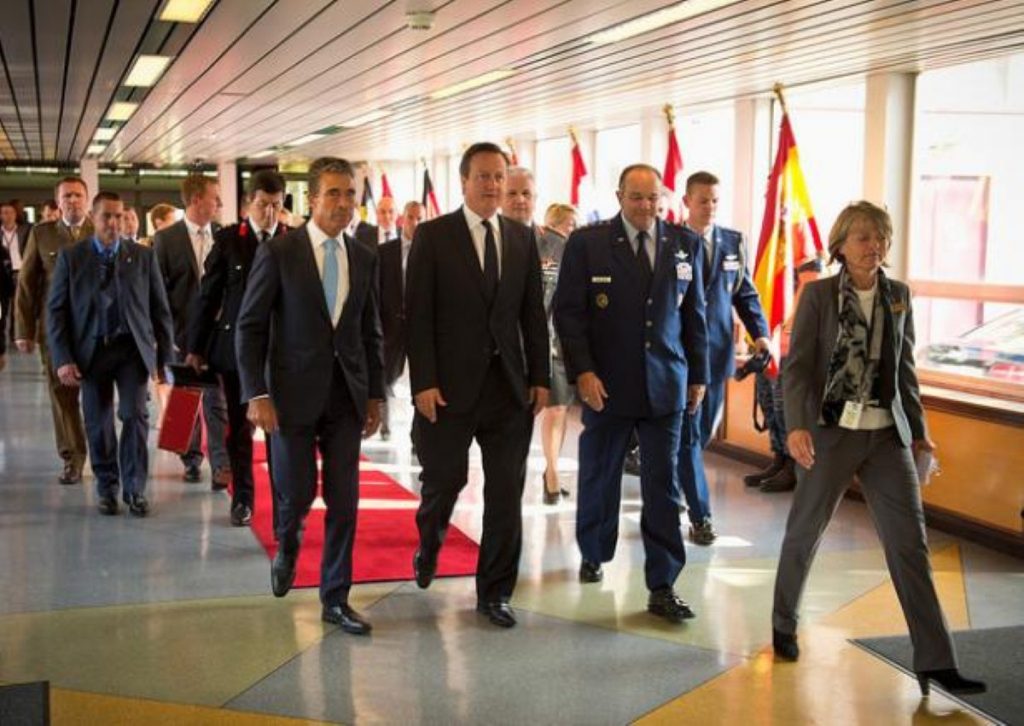Cameron ‘naked against Russia’ as Nato summit approaches
David Cameron should spend more time playing war games, a former senior RAF officer has told Politics.co.uk, as Nato prepares to deploy its forces in eastern European bases for the first time.
Air Commodore Andrew Lambert called on the prime minister and other Nato leaders to engage in scenario-based exercises in order to combat Vladimir Putin's confrontational actions in Ukraine.
His comments came as Nato's 28 member states prepare for the alliance's summit in Wales next month. One hundred and eighty VIPs, 1,500 journalists and 60 heads of state will also descend on Celtic Manor for a critical meeting which is expected to see Nato formulate a new strategy against the Kremlin.
Secretary-general Anders Fogh Rasmussen said today: "We will adopt what we call a readiness action plan with the aim to be able to act swiftly in this completely new security environment in Europe.


"We have something already called the Nato response force, whose purpose is to be able to be deployed rapidly if needed.
"Now it's our intention to develop what I would call a spearhead within that response at very, very high readiness."
But Lambert voiced fears widely held within the military that national leaders could shy away from providing the funding or political will to back the new deterrence approach.
"Most of the politicians we've got these days haven't been involved in the military," he said.
"They weren't alive in World War Two. So they're a bit naked when it comes to trying to make these decisions.
"People will come to them, great academics, saying 'you need to do this, you need to do that'. But they haven't got any first-hand experience, that's the difficulty."
Rasmussen's plans for a rapid reinforcement option have been firmly backed by the British government but other Nato member states are proving more reluctant. All but four spend less than the alliance's target of two per cent of gross domestic product on defence spending.
Many believe the new era of confrontation will require a halt to the recent decline in defence budgets, which in Nato countries have dropped by 20% in the last five years. Moscow has increased its military spending by 50% over the same period.
The Foreign Office has indicated cautious progress is being made in the run-up to the Wales summit.
Britain hopes to persuade Nato of the need for pre-positioning of equipment and supplies, the establishment of forward bases in former Warsaw Pact countries like Poland, and improved infrastructure to enable rapid reinforcements to areas threatened by Russian troops.
But Lambert believes that even with these arrangements in place, world leaders need to engage in war games that go beyond traditional military exercises.
"The minister or their deputy goes into their bunker and is then bombarded with information and told 'right then prime minister, what are you going to do?'," he explained.
"He then has to ring up his mate, presumably the president, and say 'what's your view'? Between the two of them they decide whether they're going to use more power, less power, try a media offensive, use more sanctions, withdraw, attack, etc. When you use all the panoply of your weapons, not just the military weapon, then you'll start to have a much better effect. Then you'll start to coerce the enemy."

David Cameron speaks with Welsh soldiers – but does he understand the military mindset?
MPs on the Commons' defence committee warned earlier this summer that Nato must do more to prepare for the 'asymmetric' warfare expected to become an increasingly dominant aspect of conflict areas.
Putin's tactics of sending unbadged Russian soldiers and humanitarian aid lorries into Ukraine is challenging conventional principles of warfare, leading many – including Lambert – to believe Nato must do more to prepare its responses to future asymmetric offensives.
"These people [politicians] need to understand the dynamics," Lambert added.
"Putin, as an ex-KGB colonel, knows what he's doing. He's playing this game. That's why he hasn't driven three divisions across the border. By doing it underhand, using the political and all the other things, he's been moderately successful."

Vladimir Putin with German chancellor Angela Merkel
His call was backed by Labour backbencher Gisela Stuart, a member of the committee, who said the British government had "lost the ability to make strategic decisions".
She told Politics.co.uk: "The new nature of conflict is going to be much more complex.
"I use that word very deliberately – there's a difference between things being complicated and complex.
"You need a strategic intelligence to be able to keep responding to this."
The Wales summit is viewed as a critical moment for Nato, which is seeking a new sense of purpose as international forces withdraw from Afghanistan this year.
Britain, which is chairing the summit, may attempt to change the language of Nato's 2010 strategic concept, which viewed Russia as a key strategic partner.
"It's clear now from the way Russia has acted that we have not persuaded Russia to see things Nato's way," a Foreign Office source said.
"It's likely to be some time before we do."

Russian troops on the ground in the Crimea
Defence experts are not concerned about the potential negative impact of Nato's forward movement antagonising Moscow.
Rasmussen is now raising the possibility that Nato could use rapid rotation of forces from forward bases in order to ensure a near-permanent military presence close to Russia's borders.
Both sides are aware that exercising these troops – another key element of Nato's plan – could lead to heightened pressures, however.
Rasmussen added: "We have seen the Russians improve their ability to act swiftly. They can within a very, very short time convert a major military exercise into an offensive military operation."
Allen Sykes, vice-president of the UK National Defence Association, said: "The minute real strength is shown Putin backs off.
"He's under great pressure in Russia. He wants to re-establish a buffer zone. He talks about 'greater Russia'. But he respects strength."












